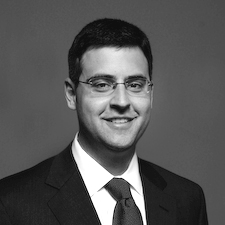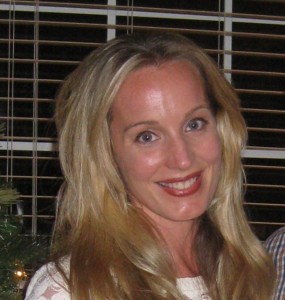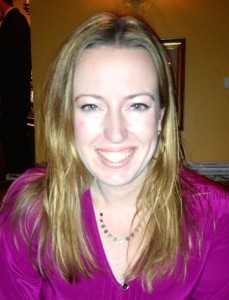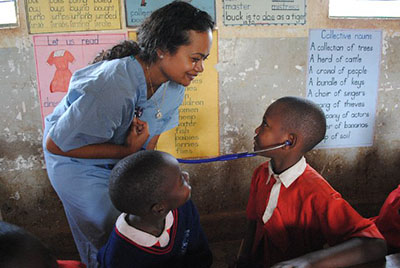 Greg Gerstenhaber is a partner in the Dallas office of Bain & Company. Greg graduated in 1997 with degrees in BHP and Finance and joined Bain immediately after graduation. He has been with the company for 16 years now and his experience includes airline, automotive, defense, construction, retail, manufacturing, and waste management. Most of his recent work has been in the industrial practice covering strategy and performance improvement. We visited with Greg to hear more about what he is doing now.
Greg Gerstenhaber is a partner in the Dallas office of Bain & Company. Greg graduated in 1997 with degrees in BHP and Finance and joined Bain immediately after graduation. He has been with the company for 16 years now and his experience includes airline, automotive, defense, construction, retail, manufacturing, and waste management. Most of his recent work has been in the industrial practice covering strategy and performance improvement. We visited with Greg to hear more about what he is doing now.
Tell me about your career progression coming up to what you are doing now.
I started with Bain as an associate consultant right after graduation. I did that for three years, then left for two years to get my MBA from Harvard. My business school tuition was paid for by Bain with the expectation that I would come back, and I did. When I returned, I was a consultant for two years, then was promoted to a manager and did that for four years. I was promoted again in 2008 to partner. Now my time is mostly spent on strategy work as well as performance improvement. I also lead our MBA recruiting efforts for Texas as well.
You consult with a number of different industries. Which type of industry do you enjoy working with the most and why?
There isn’t any one industry. I have the most fun when I am working with industries that are going through a lot of change and the work we are doing has significant impact on our client’s business. In 2008, I was working with home building and there was so much change taking place with home prices falling dramatically that it was really challenging and exciting work.
What is most challenging about the work you do?
It is fast-paced. It is always a challenge to learn a new industry. To learn a new industry you have to really dig into analyst reports and other industry materials to try to absorb as much knowledge as possible. We have found over time that one of the key ways of delivering value to clients is integrated expertise. By being able to work in different industries and different types of companies, we develop our expertise in a certain industry, but we also bring new ideas and perspectives from having worked with other industries and clients. There is a threshold level of expertise that we bring to a client, but we also know that we create a lot of value by bringing a broader perspective to the table.
How do you approach the strategy work you do?
We have a tried and true approach that we use for strategy work. We start with the same core sets of tools. We first make sure we understand the current situation and have a data driven factbase. . We then work closely with our clients to identify strategic options and then evaluate them with data. We will come up with a hypothesis of what the answer might look like, then collect the data and do the analysis to prove or disprove the hypothesis. Through all of this, we use a methodology called “profit from the core”. Companies should define and understand what their core is, and look for opportunities that are as close to the core as possible. We have a very tried and true core strategy approach that is very effective at creating value for our clients. .
How can students prepare themselves to do something similar to what you are doing?
We look for people who are passionate about what we do and have a track record of being challenged and doing well academically. We also want people who have been involved on campus and have taken on leadership roles on campus. Strong analytical skills are important in this job. We utilize a case interview method which is a very effective way for testing fit for the associate consultant job.
How have things changed at Bain over the 16 years you have been there?
I will tell you what has and hasn’t changed. What has changed is that we have grown at a very high rate. We are substantially larger now vs when I started in 1997. We have probably grown about 10 percent a year since I started working here. We have also moved towards more of a practice area focus. We have developed and advanced IP, while still enabling people to have a variety of work experience. The biggest thing that has not changed is our core mission and our core values of how we work with and deliver for our clients. We take the time to periodically reevaluate our mission and priorities, but we always come back to the same core set of values. Our business is all about our ability to deliver for our clients and help them to achieve results. Our entire DNA as a firm revolves around that.
The one constant at Bain no matter what level you are at is that you will always feel challenged. The type of work you do and roles and responsibilities will change overtime. I am less involved in the analytics and spend more time with the actual clients now. Someone coming into Bain could expect that their responsibilities will continue to grow over time, as they have for me.
How do you think your BHP education prepared you for what you are doing now?
I think it prepared me really well. The emphasis on case studies really helped to lay the ground work for the variety and the types of cases I see. The curriculum was challenging and it prepared me well. BHP has so much respect within Bain. We know that people in BHP are being prepared well and coming from a respected program. The program has benefited me in such a tremendous way. We are truly excited to come back to campus each year and meet the BHP students.
Do you have any regrets from your time on the 40 Acres? Anything you wish you would have done differently?
I wish it didn’t go as fast as it did! I feel so fortunate to have been in the BHP. I was really involved in the business council and was president of that my senior year. I was in HBA and the Cabinet of College Councils as well. These experiences were incredibly valuable to me and gave me real practical experience in working with teams to accomplish something. It was also just a lot of fun. I made friendships that have really stayed with me.
I have had a lot of good networking opportunities with my BHP classmates since graduation. When I started by MBA at Harvard, there were a couple BHP grads there who I connected with. I have also kept in touch with BHP grads in the Dallas area who are in prominent positions that I can call upon when I need advice or help.
Do you have any advice for current students?
Your time in the BHP is one of the best times you will have to learn. Take advantage of the variety of great learning experiences you get to have. Get involved in various activities on campus and have fun.





